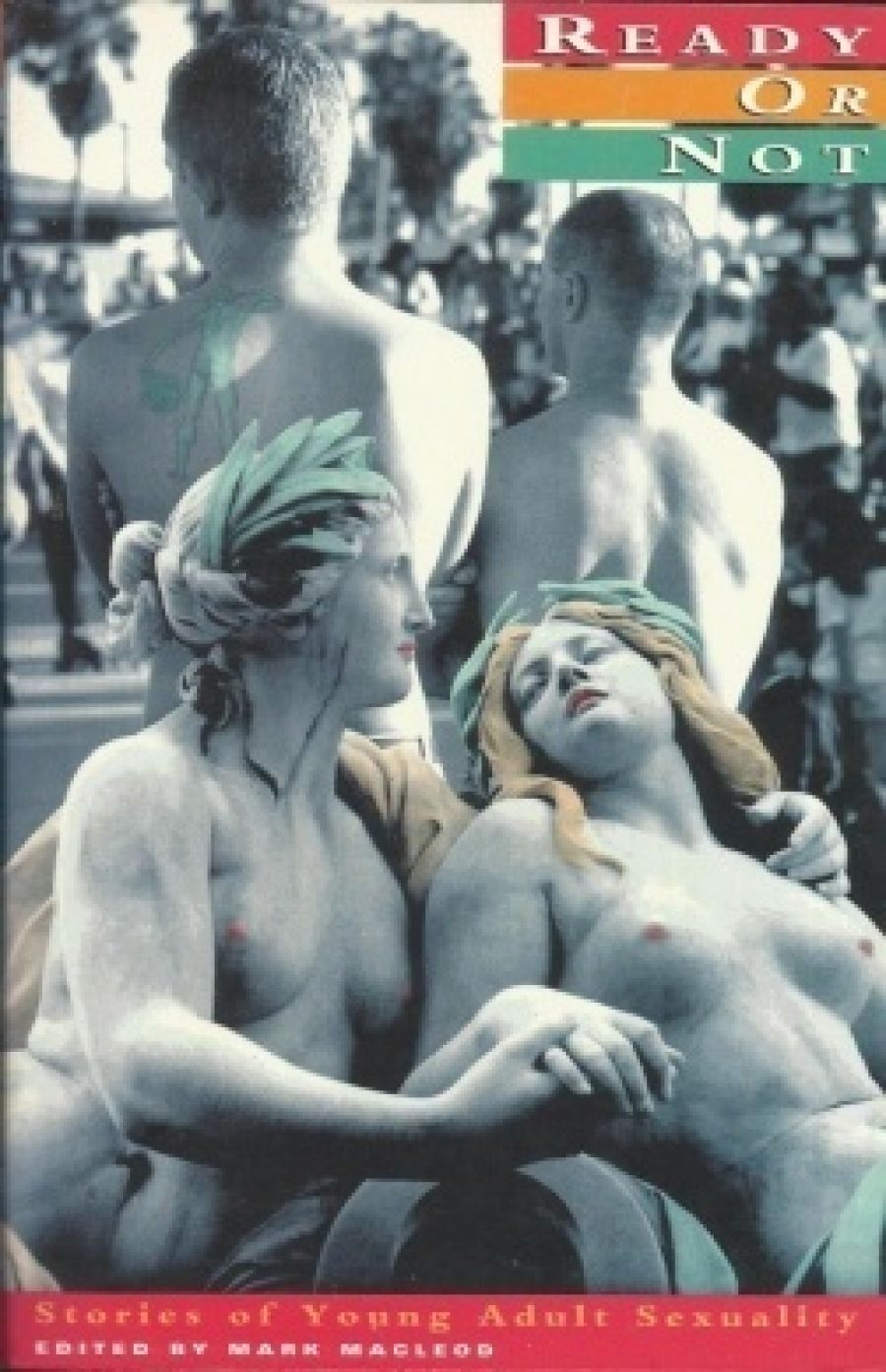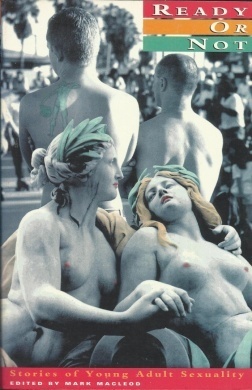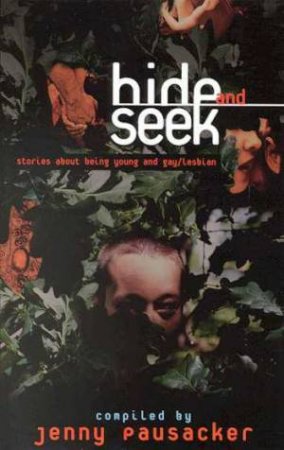
- Free Article: No
- Contents Category: Young Adult Fiction
- Review Article: Yes
- Article Title: Coming Out
- Article Subtitle: Ready or Not
- Online Only: No
- Custom Highlight Text:
‘Stories of Young Adult Sexuality’ and ‘Stories about being Young and Gay/Lesbian’ are the respective subtitles of these two bumper anthologies, coming out together in a joint marketing venture. ‘Not rivals but conspirators.’ writes Mark Macleod in the press release.
- Book 1 Title: Ready or Not
- Book 1 Biblio: Random House, $14.95 pb, 308 pp
- Book 1 Cover Small (400 x 600):

- Book 1 Cover (800 x 1200):

- Book 2 Title: Hide and Seek
- Book 2 Subtitle: Stories About Being Young and Gay/Lesbian
- Book 2 Biblio: Reed Books, $14.95 pb, 251 pp
- Book 2 Cover Small (400 x 600):

- Book 2 Cover (800 x 1200):

Both editors, in their introductions, make a point of telling us they were not concerned with the sexual preferences of their contributors. That shouldn’t need saying! They probably mean: Don’t assume that all the contributors are homosexual. (If this arouses your curiosity you’ll just have to try and guess, from the stories.) It will be a grand day when editorial defensiveness of that kind is no longer required.
Declarations of bias will always be essential. Here is mine: I was invited to review these two books for ABR, even though I have a story in Jenny Pausacker’s collection. My contribution to one of the books is likely to make me more critical, rather than indulgent.
I must confess that I have seldom been greatly moved by multiple-author anthologies. No matter how carefully the cornpiler arranges the material, I miss the sound of an evolving, singular voice to bring all the parts together.
These two collections contain a very broad range of talent and material, aimed at a very wide audience. The editors intended it that way. Most Young Adult readers will see variety, and since that is ultimately what these stories are about, the anthologies will achieve their main aim: to cross many boundaries.
Closing in on the individual stories, I found treasures all over the place. There is something splendidly audacious and strong in Hide and Seek and Ready or Not; it pushes its way through, defying criticism, flaunting its joie de vivre. It makes my novelistic notions seem merely cranky.
Here is my idiosyncratic short-list of Most Memorables, beginning with Ready or Not.
In Ben Widdicombe’s ‘Millennium’ a boy, in his upstairs room, is writing a reply to an ad in a gay magazine: Looking for a partner for the year 2000. Across the street a man is photographing planes (or is he?), for a campaign against a new runway. There is more between the lines than can be heard, at first, in this taut uncluttered piece.
‘Birthday Boy’, by Ted Ottley, is a queasily ‘jaunty’ account of a youth who acts as a decoy on a faggot-hunt. The narrative is pulled by the powerful message; thus the action, heading towards the climax (so to speak), seems a bit contrived. But the finale mitigates the awkward start. In the authors’ notes (back of book) Ottley says: ‘Before hunting in the modern world, ask the question: will your ultimate prize be a mirror?’
In ‘A Breeze off the Esplanade’ Gary Crew skilfully executes one of the hardest fears: using a totally believable teenage voice to tell a terribly sophisticated story. It’s impossible to describe without spoiling it for you. The turnabout happens without any ‘neon sign’ interference from the author. Like a shift in the wind. Exquisite.
‘Fifty Ways of Saying Fabulous’ is actually the first chapter of a novel by the same title by Graeme Aitken. It’s a tender, whimsical, rambling account of childhood. A boy of twelve years and indeterminate gender makes a unique hair-piece out of a dead cow’s tail, to transform himself into Judy Robinson from ‘Lost in Space’. I sensed that this ‘Judy’ would not end up lost amidst the petty cruelty of the ubiquitous schoolground.
In Hide and Seek the majority of stories appear to be written for Older Young Adults. There is a cool, erotic smoothness in Nigel Krauth’s ‘The Swing’. Many sharp and witty observations as Dean Kiley takes us on a geography excursion with a busload of tearaway adolescents and a secretly gay boy who
intercedes, fixes, understands, believes. Very good at being shocked and knows exactly how you feel … Though his compassion’s sneaky, only a few good intentions away from contempt as a kind of revenge.
Kiley’s title – ‘Staying In’ – sums up the entire darker side of both anthologies.
The darkness is an essential element in Caroline Macdonald’s sombre, moody ‘Stepping Stones’. A cold night for discoveries, when a young woman waits in the courtyard to speak to her father, the aspiring politician. But the only person who can speak fearlessly is Granma, with stories to tell.
A story told to a stepdaughter is the centrepiece of Nadia Wheatley’s ‘One Summer in the Land of Fez’. The softly rich colours of the elder woman’s memory merge with the bubbling colours in the pot: she is showing Rowena (who wants to be a hippy this year) how to tie-dye some clothing, and recounting a special summer of her own youth – a lesbian love, surviving on ideals and wits, the end of the Land of Fez. One of Wheatley’s great skills is her seamless blending of history, the present, a social conscience and a good story. This is one of her best.
Jenny Pausacker’s contribution, ‘Playing With Fire’, is about the wobbly border between actual and fantasy romance. A teenage girl, obsessed with two female cops in an English TV show, is determined to collect the full twenty episodes of ‘Fox and Fletcher’. Pausacker has a strong empathy with the anxious, eager, volatile young heart. ‘Playing with Fire’ should ignite a lot of memories, regardless of the orientation of the reader’s heart.
In ‘The Invitation’, Robert Dessaix has created a luxuriant tapestry of astonishing scenes out of an ordinary suburban summer. By the end of the story you have to wonder if any human life is ordinary. When Stan goes to invite Adam, the new neighbour, to a ‘little do’ on New Year’s Eve, things start getting at Stan: the ‘heavy scent and creamy flesh’ of the frangipani; ‘a brilliant bolt of aqua light from the pool’; Adam himself, daring to mention Simon. Stan ‘didn’t want his son’s name said aloud here among this oiled, slim nakedness and scented air.’
‘The Invitation’ moves towards the darkest of outcomes, yet it is full of glittering, sensual light. If this very accomplished story tends to make a few struggling stories (from both anthologies) seem weaker by comparison, well, we all know that the short story is the most difficult prose form to master; it’s good to be reminded that the end result can be sublime.


Comments powered by CComment